高一英语必修一unit4知识点总结
高一英语必修一U4笔记整理
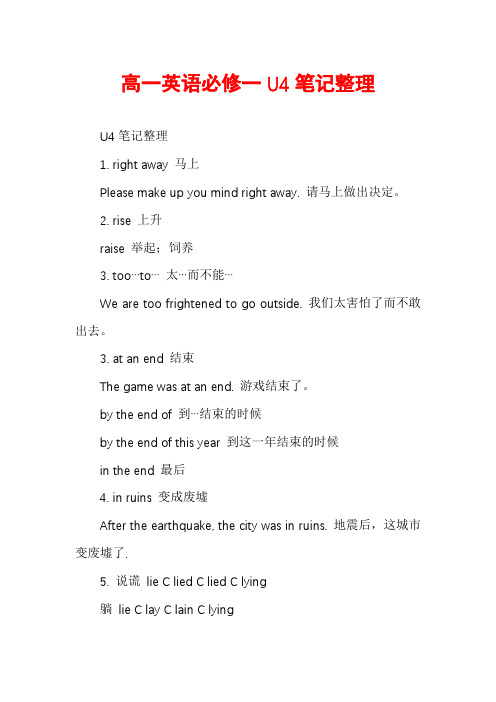
高一英语必修一U4笔记整理U4笔记整理1. right away 马上Please make up you mind right away. 请马上做出决定。
2. rise 上升raise 举起;饲养3. too…to… 太…而不能…We are too frightened to go outside. 我们太害怕了而不敢出去。
3. at an end 结束The game was at an end. 游戏结束了。
by the end of 到…结束的时候by the end of this year 到这一年结束的时候in the end 最后4. in ruins 变成废墟After the earthquake, the city was in ruins. 地震后,这城市变废墟了.5. 说谎lie C lied C lied C lying躺lie C lay C lain C lying产卵lay C laid C laid Claying规则的“撒谎”,不规则的“躺”,躺过就“下蛋”6. injure 意外伤hurt 心灵伤wound 刀枪伤7. 分数表达法:分子用基数词(one , two, three …)分母用序数词(first , sec ond , third,…)分子超过1,分母+s1/3 one third 2 4/5 two and four fifths 2/3 two thirds 1/2 a half8. shock 震惊I was shocked at the bad news. 我对这个坏消息很震惊。
9. the dead 死难者the+形容词表示一类人the old 老人the young 年轻人U5 笔记整理1. die for 为了…而死die for the country 为了国家而死die of 死于内因die of cancer 死于癌症(内因)die from 死于外因die from a car accident 死于车祸(外因)2. fight against 与…作斗争We have to fight against difficulties. 我们必须和困难作斗争。
高一英语必修一Unit4Earthquakes知识点讲解和练习

1、关系代词which用来指物,在从句中可作主语或宾语。
This is a book which tells about space rocket technology.(作主语)
The letter which I received yesterday was from my brother.(作宾语)
【归纳总结】
give out分发;发出;用完give sth.away赠送;颁发;泄露
give back归还;复原givein呈上;倒戈,屈服,认输
give off发出,放出give over停止,中止
give up放弃give on to/onto sth.朝向,面对;通向
8、Your speech was heard by a group of fivejueges,all of whom agreed that it was thebest one this year.
易混词
辨析
例句
injury
多指意外事故受伤。比hurt正式,hurt多指伤痛,而injure则指损害健康、成就、容貌等,强调功能的损失。
A bullet injured his lefgt eye.
hurt
既可指肉体上的损害,也可指精神上、感情上的损害;作不及物动词,意为“(身体某部位)难受”。指肉体上的损害时,hurt可与badly,slightly,seriously等连用,但若指精神上的创伤,只能说very much/rather/deeply hurt。
(1)n.裁判员;法官;审判员
His father used to be a judge.他的父亲过去是一名法官。
(2)v.推断;断定
人教版高一英语必修1Unit4课本知识点详解及练习

人教版高一英语必修 1 Unit4 课本知识点详解及练习Unit4 Earthquakes知识点详解Ⅰ. 常考单词必背1. burst vi. (burst,burst) 爆裂;爆发n. 突然破裂;爆发She burst into tears on hearing the sad news.一听到这一不幸消息,她突然哭了起来。
Upon his appearance,there was a burst of applause.他一出现就爆发了一阵掌声。
[快速闪记](1)burst in打断;闯入;突然出现burst into...突然开始;闯入……burst into laughter/tears =burst out laughing/crying突然大笑/哭起来(2)a burst of一阵……2. injure vt. 损害;伤害Most of the injured were women and children.大多数伤员都是妇女和儿童。
[快速闪记](1)injured adj.受伤的the injured伤员(2)injury n.伤;伤口;伤害3. shock vt.& vi.(使)震惊;震动n. 休克;打击;震惊I was shocked to hear that he had resigned.听到他辞职的消息我感到很震惊。
The news of my promotion came as a shock.我获晋升的消息着实让我一惊。
[快速闪记](1)be shocked by/at...对……感到震惊be shocked to do...因做……而震惊(2)a shock一件令人震惊的事(抽象名词具体化用法)(3)shocked adj.感到震惊的shocking adj.令人震惊的4. rescue n.& vt.援救;营救All the people nearby came to her rescue when hearing her cry for help. 周围的人们听到她的呼救声都来营救她。
高一英语必修一Unit4知识点归纳.ppt
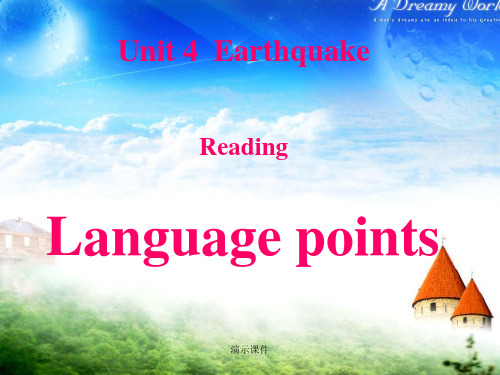
=All of them burst into laughter/tears/songs.
burst out +v-ing :suddenly begin doing sth
扩展: burst into leaf burs into flower
长出叶子 开花
n. a burst of ...一阵... a burst of laughter /thunder /applause(欢呼)
by the end of in the end ★at the end of “在…尽头;在…末” ★by the end of “到/截止……末”;主句一般用完成 时 ★in the end 意思“最后、终于”= at last/ finally 1. Wash your hands ___a_t_t_h_e_e_n_d__o_f__ the experiment.
2. To tell you the truth, I __t_h_in_k__p_o_o_rl_y_o_f_ Tom, who is very lazy and never knows what to do .
5. It seemed as if the world was at an end.
演示课件
“too…to…”结构之前带有only,but,never,not,时, 是强调肯定的表示法,译作“非常……”“十分…” “实在……””真是太……”等
I am only too happy to teach you. 我非常高兴教你们。
He is but too glad to do so 他非常喜欢这样做
1. The city _l_a_y_/_w_a_s_i_n_r_u_i_n_s (成为废墟)after
人教版高一英语必修一第四章知识点整理
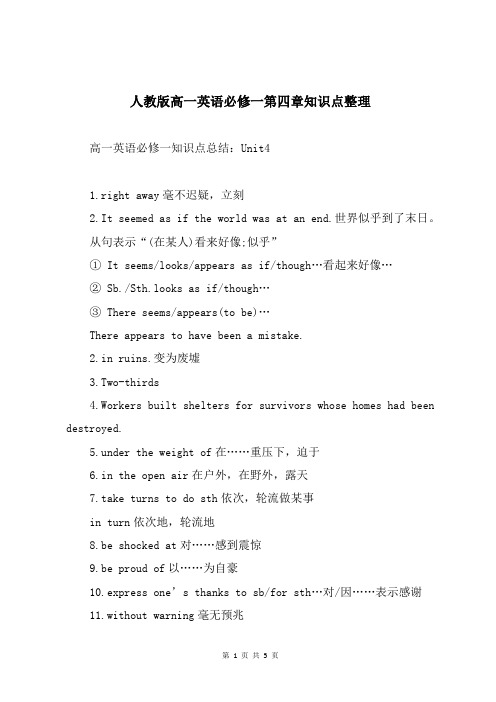
人教版高一英语必修一第四章知识点整理高一英语必修一知识点总结:Unit41.right away毫不迟疑,立刻2.It seemed as if the world was at an end.世界似乎到了末日。
从句表示“(在某人)看来好像;似乎”① It seems/looks/appears as if/though…看起来好像…② Sb./Sth.looks as if/though…③ There seems/appears(to be)…There appears to have been a mistake.2.in ruins.变为废墟3.Two-thirds4.Workers built shelters for survivors whose homes had been destroyed.5.under the weight of在……重压下,迫于6.in the open air在户外,在野外,露天7.take turns to do sth依次,轮流做某事in turn依次地,轮流地8.be shocked at对……感到震惊9.be proud of以……为自豪10.express one’s thanks to sb/for sth…对/因……表示感谢11.without warning毫无预兆12.next to紧接着,相邻,次于13.get away from…避免,摆脱,离开14.disaster-hit areas灾区15.Listening to English is a very important skill because it is only when we understand what is said to us that we can have a conversation with somebody.听英语是一项很重要的技能,因为只有当我们懂得别人给我们说什么我们才能与他交谈。
高一英语必修一_unit4_知识点

hurt His words ______her feelings.
hurts It ______the eyes to read in the sun.
injured More than 200 people were _________in the car accident. wounded The soldiers were __________-in the battle.
•ruin n.【C】倒塌的建筑物,废墟
短语:be/lie in ruins 倒塌,破败不堪
fall into ruins 衰落,败落
eg: 现在这座城市已成为一片废墟了。
The city now is/lies in ruins.
• ruin oneself/hopes v. 毁灭,毁坏
e.g.. If you go on like this, you will ruin youself.
7.extreme极度的,极端的,偏激的
• extreme weather • extreme condition • extreme sports
• extremely adv.
9.shock vi.&vt. (使)震惊,震动 n. 休克,打击,震惊
shocking The news is ___________(shock).
2. A smelly gas smelly : smell+ y = adj.
smell n./v (smelt/ smelled)
扩展: n.+y构成形容词
blood + -y = bloody rain + -y = rainy cloud + -y = cloudy wind + -y = windy snow + -y = snowy greed + -y = greedy taste+ -y = tasty sun + -y =sunny ice + -y = icy fat + -y = fatty mud+ -y = muddy 泥泞的 fog + -y = foggy health wealth
高一英语必修一unit4知识点总结四

高一英语必修一unit4知识点总结四高中英语必修四unit4知识点2It 作形式宾语用来替代作宾语的`从句、动词不定式、动名词,而把真正作宾语的从句、动词不定式、动名词置于句尾。
It 作形式宾语的常见句型:1. verb+ it+ adj./noun (for/of) to do/clause (verb=think, believe,suppose, consider, feel, make, keep…)例 I think it hard for you to do the task on your own./I think it hard that you'll do the task on your own.2. verb+it+adj./noun (one's) doing(adj.=useless/worth/worthwhile)(noun=no use/no good/worth one's while/a wasteof time/money/energy/words) (verb=think, believe, suppose, consider, feel,make, keep…)例 I'll make it worth your while telling me about his secret.3.verb+it+important/unimportant/necessary/unnecessary/ natural/essential that … (should)…verb+it+ofmuch/great/no/little importancetha t…(should)…(verb=think, believe, suppose, consider, feel, make, keep…)例 I think it important that you (should) attendthe conference.4. verb + it+ as+ noun/adj.+ clause (verb=accept, regard, take, see,view)例 The lecturer takes it as encouraging when so many students attendhis lecture.5. v. +it + prep. + that…owe it to sb. that…把…归功于…leave it to sb that…把…留给某人去做take it for granted that …想当然keep it in mind that…例 Don't bother to arrange anything. Just leave it to me to sort out.6. It用在不能直接跟宾语从句的动词后面,尤其是表示好恶的动词后,enjoy,like, love, dislike, resent, hate, don't mind, be fond of, feel like, see to 宾语从句紧跟it之后例 I hate it you can swim so well and I can't.7. It用在不能直接跟宾语从句的介词后面,宾语从句紧跟it之后(except that例外)例 I'm for it that you will follow their advice.高一英语必修一unit4知识点总结 (菁选2篇)(扩展4)——英语高一必修1知识点总结5篇英语高一必修1知识点总结1重点单词major local represent curious introduceapproach stranger express action generalavoid misunderstand similar agreement *punish intend means universal culturalapologize behave bow flight defencedormitory canteen dash fortable distanceprefer touch custom false hugfunction international powerful greet fistyawn threaten respectful association gesture英语高一必修1知识点总结2重点句子1. Whichever and whatever you like, there is a theme park for you!2. With all these attractions, no wonder tourism is increasing wherever there is a Disneyland.3. To enter a world of fantasy about ancient England, e to Camelot Park!4. Futuroscope is not only for inpiduals, but is also the perfect mix of fun and learning for class outings.5. If driving, Futuroscope is within easy reach of the freeway.6. Visit the candy shop to try the same kind of candy that American southerners made 150years ago, or take a ride on the only steam engine train still working in the …7. After that, joined some drivers and went to the bottom of the ocean to see the strange blind creatures that have never seen sunlight.Visitors can get close to parts of the world they have never experienced, going to the bottom of the ocean, flying through the jungle or visiting the edges of the solar system。
高一英语必修一Unit4重点英语词汇和句子

高一英语必修一Unit4重点英语辞汇和句子Unit 4 EarthquakesWord usage1. shake 1)v. (shook, shaken)to (cause to) move up and down or from side to side with quick short movements. 2) n. [C usually sing.] an act of shakingThe house shook when the earthquake started.Shake the bottle before taking the medicine.He came forward and shook me by the hand. =He came forward and shook hands with me.He was shaking with anger.She answered “no” with a shake of the head.2. rise 1) vi. (rose, risen) to move from a lower to a higher level or position; go up 2) n. [C (in)] an increase in quantity, price, demand etc.The sun has not yet risen.The population of the city has risen to five million.He rose and left the room.There will be a rise in unemployment nextyear.There’s been a sharp rise in the cost of living.2. pond n. an area of still water smaller than a lake, especially one that has been artificially madeSome cattle were drinking at the pond.There are some fish living in the pond.When an earthquake is coming, fish will jump out of ponds.3. burst 1) v. to (cause to ) break open or break apart suddenly and violently, usually as a result of pressure from within and often cause the contents to become widely scattered.2) n. an act of result of bursting; (of) a sudden short period of great activity, loud noise, strong feeling; outbreakThe balloon burst.After ten days of rain the river burst its banks.A burst of hand-clapping followed the ending of the song.4. canal n. an artificial stretch of water dug in the ground to allow ships or boats to travel alongit, or to bring water to or remove water from an areaCoal used to be sent here bycanal.Canals have been built to irrigate the desert.The Panama Canal joins two oceans.5. steam n. [U] 1) water in the state gas produced by boiling2) power or effort produced by steamunder pressure, and used for making things work or moveWho invented the steam engine?Steam was used to be the power of a train.There is steam bursting from that hole.6. ruin 1. n. a) [U] the cause or state of destruction and decayb) [C] a building that has been badly damaged or destroyed2. vt. a) to spoil or completely destroy a person or thingb) to cause someone to loss all their moneyThe temple has fallen into ruin.We visited the ruins of the temple.The heavy rain ruined our holiday.The hurricane ruined all the houses here.The flood ruined the crops.If I lose my lawsuit(官司), the cost willruin me.7. injure vt. to cause physical harm to (a person or animal), especially in an accident; hurt seriously; to damageI hope I didn't injure her feelings.His back was injured.Two people were killed and seven were injured.His reputation will be badly injured by the vicious rumour.8. destroy vt. to damage sth so severely that it can not be repaired; put an end to the existence of; ruinA fire destroyed the house.What he said destroyed our last hope.All hopes of peaceful settlement were destroyed by his speech.9. brick n. [C,U] 1) a hard piece of baked clay used for building2) sth. in the shape of a brickThey used yellow bricks to build the house.The tower is made of bricks.Bricks covered the ground like red autumn leaves.10. useless adj. not of any useThis knife is so blunt. It’s useless.I realized it was useless to reason with him.I was useless at maths. = My maths is very poor.11. shock 1) n.a) [C, U] a violent force from sth such as explosion, a crash or a hard blowb) [C, U] the feeling you get after sth unexpected and usually very unpleasant has suddenly happened, or you have received an unexpected piece of newsc) the poor medical condition of someone who has an accident and whose heart and lungs are not working properly2) v. to make someonefeel very upset, angry, or unpleasantEarthquake shocks areoften felt in Japan.The news of his death was a shock tous.The traffic accident sent him into a state of shock.They were shocked by her rudeness.We were shocked by his sudden death.12. rescue v. to save someone or sth from harm or dangerHe rescued three children from the burning building.The life boat was sent out to rescue the sailors from the sinking ship.The boy was rescued after hours at sea.13. disaster n. [C,U] a sudden event causes great loss or harmWe were all shocked by the disaster.The earthquake is one of the worst natural disasters the country has ever suffered. People beganto wonder how long the disaster would last.14. organize v. to plan and arrange an event; to arrange things in a sensible orderWe'll organize an oral English contest.The story is very well organized.They organized the truckers into a union.15. shelter 1) n. a) [U] protection, especially from bad weatheror danger b) a building that protects you from weather or danger.2) vt. to protect someone or sth from bad weather or danger;vi. to stay in a place in order to be protected frombad weather or dangerThe umbrella is a poor shelter from heavy rain.Their immediate need is for food, clothing andshelter.The wall sheltered us from the wind.She was accused of sheltering a murderer.She wad sheltered by the USA.In the rain people were sheltering in the doorways of shops.16. fresh adj.1) new and different (only before a noun ); 2) recently picked, caught, produced and therefore in good condition (used of food); 3) clean, cool and pleasantThey buy fresh meat.Thiskind of fish lives in fresh water.She is fresh fromuniversity.She is quite fresh to office work.17. percent n. parts for each 100The bank has increased its interest rate by one percent.Over ninety percent of the islanders here areilliterate.He spends a large percent of his income on food and drink.18. speech n. 1) [C] a formal talk to a group oflisteners2) [U] the ability to speak or the act of speaking3) [U] way of speakingThe chairman made an opening speech.She is researching speech development in children.We express our thoughts by speech.By your speech I can tell you're from Hong Kong.19. judge 1) vi. & vt. to decide who or what is thewinner in a competition2) [vt. + that] to form or give an opinion about someone or sth after careful thoughtjudging from, judging by…3) n. a public official who has the power todecide questions brought before a court of law; a person who has the knowledge and experience to give an opinion about the value of sthYou can't judge a book by its cover.He is going to judge the first race.We must judge whether he is guilty.The prisoner was taken before the judge.He was one of the judgesat the horse race.20. honour 1) n. a) [U] great respect and admirationb) [sing] sth that brings great respect and pride2) v. to show respect to sb. or to praise sb. publiclyWe fightfor the honor of our country.He is an honor to ourschool.Children should be taught to show honor to theirelders.He honors his teachers.20. prepare 1) vt. to make sth. ready for a future event or action2) vi. to get ready to do sth.They prepared themselves for the worst.When we arrived home, mother had already prepared dinner for us.I waspreparing for bed when I heard a knock at the eful expressions1. right awayat once ; in no time; immediatelyIwill return the book right away.I am getting in touch with him right away.We are about to start right away.2. end1) at an endfinish; overIt seems that the world was at en end.2) bring… to an end =put an end to…I wonder how I can bring the dispute to an end.=I wonder how I can put an end to thedispute.3) come to an endThe meeting came to an end at midnight.4) at the end of…At the end of the road there is a shop.5) by the end of…How many English words have you learned by the end of last term?6) in the end =at last; finallyHe will be a scientist in the end.3. dig out1) to get sth out of a place, using a spade or your hands2) to find sth you have not seen for a long time, or that is not easy to findLet’s dig out the roots.Why did you dig out all those old magazines?We must dig the truth out of him.1. a (good \ great \ large) number of+ n.(pl.)many; a large quantity of; a lot ofA good number of students are not interested in modern art.I’ve seen the film a number of times.The Great Wall attracts a great number of foreign tourists every day.the number of…The number of private colleges has increased.= Private colleges have increased in number.5. give out1) to give sth to a number of different people, especially to give information to people2) to produce light, heat, a sound, a gas, smell etcYou have no right to give my telephone number out.Students were giving out leaflets(传单)to everyone on the street.The teacher gave out the examination papers.The radiator (散热器) is giving out a lot of heat.与give有关的常用短语还有:give away 送掉,捐赠give in 让步,屈服give off 发出(气味、光、热、声音等),此时相当于give outgive up 舍弃give back 归还6. thousands of基数词+s,并不表示确切的具体数字,可以单独使用,也能够先接介词of再接复数名词。
高一英语必修一unit4知识点总结大全

高一英语必修一unit4知识点总结大全高一英语必修一unit4知识点总结重点词汇、rightaway立刻,马上(=atonce=innotime)asleep睡着的;熟睡地(fallasleep入睡)sleep睡;睡眠sleepy犯困的itseemsthat/asif…看来好像…;似乎inruins成为废墟thenumberof…的数量(做主语时,谓语动词用单数)anumberof大量(做主语时,谓语动词用复数)betrapped被困howlong多长时间howoften多久一次,指频率howsoon还要多久(用于将来时当中,用in+时间段回答)hundredsofthousandsof成千上万的digout挖出shake泛指“动摇,震动”,常指左右、上下动摇,也可以指人“震惊,颤抖”例:Shefelttheearthshakingunderhim.Shewasshakenwithanger.quake指较强烈的震动,如地震Thebuildingquakedonitsfoundation.tremble指人由于寒冷、恐惧、不安等引起的身体的抖动或声音的颤抖例:SuddenlyIsawherlipsbegintotrembleandtearsbegintoflowdownhercheeks.shiver多指寒冷引起的颤抖、哆嗦例:Asuddengustofcoldwindmademeshiver.rise(rose—risen)vi,上升;升起,无被动语态giveriseto引起raise(raised—raised)vt,举起;筹集;养育arise(arose—arisen)vt,出现(常指问题或现象)injure常指因意外事故造成的损伤,也可以指感情上名誉上的伤害例:Hewasinjuredinacaraccident.harm泛指“伤害,损害”,既可以指有生命的,也可以指无生命的例:Hewasafraidthathisfury(暴怒)wouldharmthechild.Hisbusinesswasharmedforsomereason.hurt既可以指肉体上的伤害,也可以指精神上的伤害例:Shehurtherlegwhenshefell.Hefelthurtatyourword.wound一般指枪伤、刀伤等在战场上受的伤例:Thebulletwoundedhiminthearm.bepreparedfor…=makepreparationsfor…为…做准备inone’shonor向…表示敬意;为纪念be/feelhonoredtodo…做…感到很荣幸make/give/deliveraspeech发言openingspeech开幕词give/provideshelterto…向…提供庇护所seekshelterfrom…躲避happentodosth.偶然;碰巧happen指偶然发生takeplace指事先计划好的事情发生高一英语必修一知识点重点句型Thenumberofpeoplewhowerekilledorinjuredintheearthquakereachedmorethan400,000.(定语从句)死伤的人数达到40多万。
Unit 4 Natural Disasters 词汇知识点 高一英语(人教2019版必修第一册)
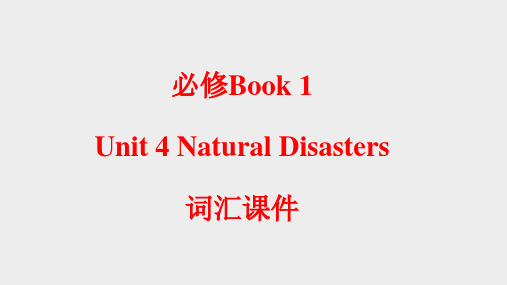
• 复活; (使)苏醒
• 【同根词】
• revival n[U]&[C]振兴;复苏
effort
•n
• ①[U]&[C]气力;精力 • be (well) worth the effort 值得努力 • without effort毫不费力地 • ②[C]努力;尽力 • make an effort/efforts to do sth 努力做某事 • spare no effort不遗余力 • ③[C] [常用于名词后]有组织的活动
destroy
• vt
• ①毁坏;摧毁;毁掉。 • ②消灭;杀死
• 【同根词】
• destruction n[U]毁坏,毁灭 • destructive adj.具有毁灭性的
evacuate
•v
• ①vt (把人从危险的地方)疏散;撤离 • ②vt&vi (从危险的地方)撤出;撤空
helicopter
pipe
•n
• [C]&[U]管子;导管;烟斗
whistle
• vi
• 吹口哨;鸣笛
•n
• [C]哨子;口哨
emergency
•n
• [C]&[U]紧急情况;突发事件;非常时刻 • an emergency exit 紧急出口
• 【同根词】
• emergent adj.紧急的
calm
• adj
context
•n
• [C]&[U](文章的)上下文;语境; (事情发生的)背景
suffer
•v
• ①vi&vt患(病); (因疾病)受苦 • suffer from...遭受...(疾病) • ②遭受(困难等) • ③(事情)变差;变糟
高一英语必修一unit4知识点总结
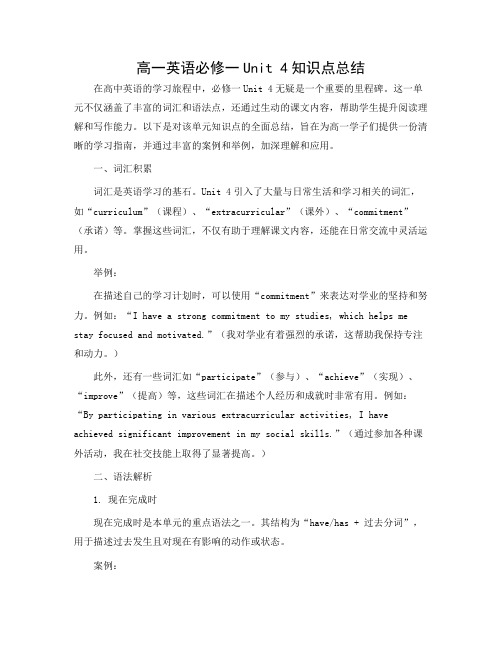
高一英语必修一Unit 4知识点总结在高中英语的学习旅程中,必修一Unit 4无疑是一个重要的里程碑。
这一单元不仅涵盖了丰富的词汇和语法点,还通过生动的课文内容,帮助学生提升阅读理解和写作能力。
以下是对该单元知识点的全面总结,旨在为高一学子们提供一份清晰的学习指南,并通过丰富的案例和举例,加深理解和应用。
一、词汇积累词汇是英语学习的基石。
Unit 4引入了大量与日常生活和学习相关的词汇,如“curriculum”(课程)、“extracurricular”(课外)、“commitment”(承诺)等。
掌握这些词汇,不仅有助于理解课文内容,还能在日常交流中灵活运用。
举例:在描述自己的学习计划时,可以使用“commitment”来表达对学业的坚持和努力。
例如:“I have a strong commitment to my studies, which helps me stay focused and motivated.”(我对学业有着强烈的承诺,这帮助我保持专注和动力。
)此外,还有一些词汇如“participate”(参与)、“achieve”(实现)、“improve”(提高)等,这些词汇在描述个人经历和成就时非常有用。
例如:“By participating in various extracurricular activities, I have achieved significant improvement in my social skills.”(通过参加各种课外活动,我在社交技能上取得了显著提高。
)二、语法解析1. 现在完成时现在完成时是本单元的重点语法之一。
其结构为“have/has + 过去分词”,用于描述过去发生且对现在有影响的动作或状态。
案例:小李在英语课上被问到:“Have you finished your homework?”(你完成作业了吗?)小李回答:“Yes, I have finished it.”(是的,我已经完成了。
2023外研版高一英语必修一Unit4重点知识

2023外研版高一英语必修一Unit4重点知
识
本文档将重点介绍2023外研版高一英语必修一Unit4的相关知识。
1. 单词和短语
本单元涉及的重点单词和短语包括:
- poverty:贫穷
- charity:慈善
- empathy:同理心
- gratitude:感激之情
- stereotype:刻板印象
- bias:偏见
- volunteer:志愿者
- optimism:乐观主义
2. 语法知识
本单元的重点语法知识有:
- 宾语从句:介绍如何使用宾语从句来表达他人的感受和态度。
- 特殊疑问句:研究如何使用特殊疑问词来构造疑问句,以获
取他人的意见和信息。
- used to和be used to:掌握used to和be used to的用法和区别。
3. 阅读和听力技巧
本单元的阅读和听力技巧包括:
- 掌握关键词和上下文推测词义的能力,快速理解文章和对话
的主题和要点。
- 注意细节,提高阅读和听力的准确性。
- 学会有针对性地提问以提高对文章和对话的理解能力。
4. 写作技巧
本单元的写作技巧有:
- 研究如何写一篇有关慈善的英文演讲稿。
- 掌握描述人物外貌和性格特征的表达方式。
- 学会使用恰当的连接词来连接句子和段落,使文章结构更加清晰和连贯。
5. 文化知识
本单元还将介绍一些与慈善和社会问题相关的文化知识,例如不同国家的慈善组织和相关的传统节日。
以上是2023外研版高一英语必修一Unit4的重点知识概述,希望对您有所帮助!。
高一必修一unit4知识点
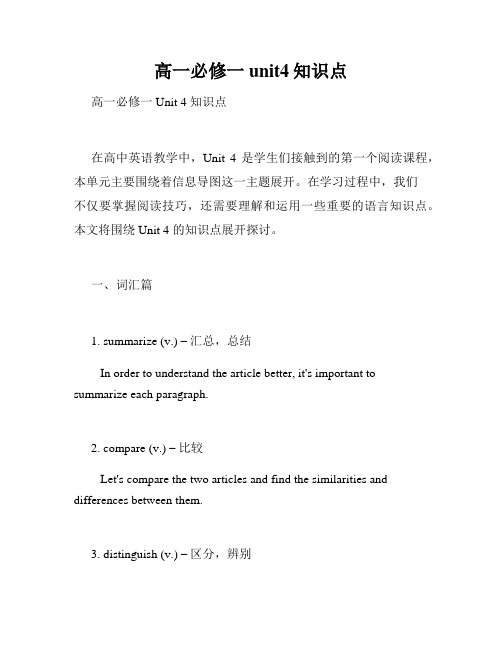
高一必修一unit4知识点高一必修一 Unit 4 知识点在高中英语教学中,Unit 4 是学生们接触到的第一个阅读课程,本单元主要围绕着信息导图这一主题展开。
在学习过程中,我们不仅要掌握阅读技巧,还需要理解和运用一些重要的语言知识点。
本文将围绕 Unit 4 的知识点展开探讨。
一、词汇篇1. summarize (v.) –汇总,总结In order to understand the article better, it's important to summarize each paragraph.2. compare (v.) –比较Let's compare the two articles and find the similarities and differences between them.3. distinguish (v.) –区分,辨别It is difficult to distinguish between twins because they look so similar.4. distinguish…from… –将…与…区分开来It is important to distinguish fact from fiction when reading news sources.5. classify (v.) –分类,归类The books in the library are classified according to genre and author.6. edit (v.) –编辑,剪辑The editor will edit your article before it is published.7. revise (v.) –修订,修改Before submitting the essay, make sure to revise and correct any grammatical errors.8. transfer (v.) –转移,转换The teacher encouraged the students to transfer their knowledge from the textbook to real-life situations.二、语法篇1. used to do sth. –过去常常做某事(现在不做了)I used to play basketball every Sunday, but now I prefer swimming.2. be used to –习惯于After living in the city for a year, I am used to the noise and fast pace of life.3. be/get accustomed to –习惯于She got accustomed to waking up early after a week of early morning meetings.4. be/get used to –习惯于After wearing glasses for a month, she finally got used to them.5. prefer…to… –更喜欢…而不是…I prefer watching movies to reading books because they are more visually stimulating.6. instead of –代替,而不是Instead of going out, I decided to stay at home and work on my homework.7. neither…nor…–既不…也不…Neither John nor Jane enjoys playing video games.8. both…and… –既…and…Both the teachers and the students participated in the school's charity event.三、阅读理解在阅读理解中,我们需要掌握一些常用的阅读技巧,如略读、精读、找关键词等。
高一英语必修一知识点高一英语必修一知识点总结unit4句型

高一英语必修一知识点高一英语必修一知识点总结unit4句型Unit 4 句型总结1. There be 句型- There is/are + 名词 + 地点/情况- There is/are + 数字/量词 + 名词 + 地点/情况- There is/are + 形容词 + 名词 + 地点/情况- There is/are + 名词 + of + 名词 + 地点/情况2. 表示喜欢或爱好的句型- Like/love/enjoy + 动词ing- Like/love/enjoy + 名词3. 句型的疑问形式- 现在简单句:Do/Does + 主语 + 动词原形?- 过去简单句:Did + 主语 + 动词原形?- There be 句型:Is/Are + there + 名词 + 地点/情况?4. 一般过去时句型- 肯定句:主语 + 动词过去式 + 其他- 否定句:主语 + didn't + 动词原形 + 其他- 疑问句:Did + 主语 + 动词原形 + 其他?5. 情态动词 can 表示能力- 肯定句:主语 + can + 动词原形 + 其他- 否定句:主语 + can't + 动词原形 + 其他- 疑问句:Can + 主语 + 动词原形 + 其他?6. 表示习惯的句型- 主语 + 动词(s) + usually/always/often/sometimes + 其他- 主语 + don't/doesn't + 动词 + usually/always/often/sometimes + 其他?7. 特殊疑问句- 特殊疑问词 + 一般疑问句?- 例:When did you go to the zoo?(你什么时候去动物园的?)。
高一(上)英语必修一Unit4-Earthquakes重点单词短语归纳整理
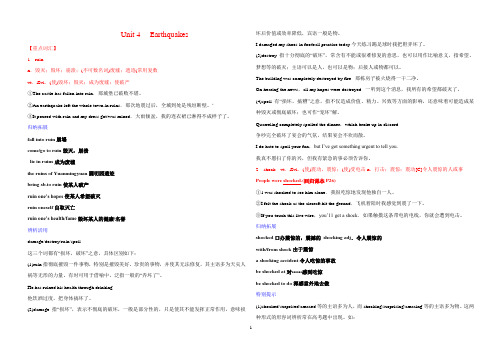
Unit 4 Earthquakes【重点词汇】1 ruinn.毁灭;毁坏;崩溃;(不可数名词)废墟;遗迹(常用复数vt.&vi.(使)毁坏;毁灭;成为废墟;使破产①The castle has fallen into rain.那城堡已破败不堪。
②An earthquake left the whole town in ruins.那次地震过后,全城到处是残垣断壁。
‘③It poured with rain and my dress got/was mined.大雨倾盆,我的连衣裙已淋得不成样子了。
归纳拓展fall into ruin崩塌come/go to ruin毁灭,崩溃lie in ruins成为废墟the ruins of Yuanmingyuan圆明园遗迹bring sb.to ruin使某人破产ruin one’s hopes使某人希望破灭ruin oneself自取灭亡ruin one’s health/fame毁坏某人的健康/名誉辨析活用damage/destroy/ruin/spoil这三个词都有“损坏,破坏”之意,具体区别如下:(1)ruin指彻底摧毁一件事物,特别是摧毁美好、珍贵的事物,并使其无法修复,其主语多为天灾人祸等无形的力量。
有时可用于借喻中,泛指一般的“弄坏了”。
He has ruined his health through drinking.他饮酒过度,把身体搞坏了。
(2)damage指“损坏”,表示不彻底的破坏,一般是部分性的,只是使其不能发挥正常作用,意味损坏后价值或效率降低,宾语一般是物。
I damaged my shoes in football practice today.今天练习踢足球时我把鞋弄坏了。
(3)destroy指十分彻底的“破坏”,常含有不能或很难修复的意思,也可以用作比喻意义,指希望、梦想等的破灭;主语可以是人,也可以是物;后接人或物都可以。
新人教版高一英语必修一第四单元知识点
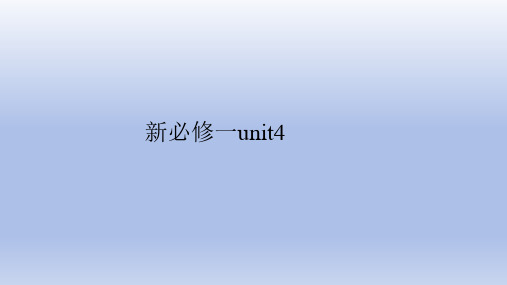
v. 毁坏;毁掉;使破产
I was ruined by the law case. 我被那场官司搞得倾家荡产。 ruin oneself 毁掉自己 ruin one’s hopes 使某人希望破灭
【拓展】destroy, ruin, damage的区别 ①damage指部分“损坏”、“破坏”或指使用价值有所降低。它可以用
灭”解,也可以指希望、计划等打破。 His hope of being a writer was destroyed. 他想成为一个作家的希望破灭了。
③ruin则表示破坏严重,以致不能修复,但这种破坏不像destroy那样毁灭某 物,而是强调致使该物的使用价值发生了问题。用作动词时,它
作“使毁灭”、“使崩溃”解;用作名词时,它表示“毁灭”、“瓦解”、 “废墟”等抽象概念。
这三个词都是形容词: electric 多指用电作为动力的。 electrical表示与电力生产或使用相关的。 electronic电子的,电子器件的
作动词,也可以用作名词,用作名词时常与to something 连用。 Hundreds of houses in the area were damaged by the storm. 暴风雨毁坏了这
个地区数以百计的房屋。 ②destroy只能用作动词,指彻底破坏,以致不可能修复,常作“破坏”、“毁
【随堂练习】汉译英: 1. 看到邻居们如何对待孩子,我感到震惊。 _____________________________________________________________
2. 他妻子去世的消息对他打击太大了。 _____________________________________________________________
- 1、下载文档前请自行甄别文档内容的完整性,平台不提供额外的编辑、内容补充、找答案等附加服务。
- 2、"仅部分预览"的文档,不可在线预览部分如存在完整性等问题,可反馈申请退款(可完整预览的文档不适用该条件!)。
- 3、如文档侵犯您的权益,请联系客服反馈,我们会尽快为您处理(人工客服工作时间:9:00-18:30)。
高一英语必修一unit4知识点总结知识能够被获得,并且因为它的本质,知识总是局部的,它永远都不是完整的,所以,一切源于知识的行动也都是局部的、不完整的。
下面给大家分享一些关于高一英语必修一unit4知识点,希望对大家有所帮助。
高一英语必修一unit4知识1重点词汇、短语1. right away 立刻,马上(= at once = in no time)2. asleep 睡着的;熟睡地(fall asleep 入睡)sleep 睡;睡眠sleepy 犯困的3. it seems that/as if… 看来好像…;似乎4. in ruins 成为废墟5. the number of …的数量(做主语时,谓语动词用单数)a number of 大量(做主语时,谓语动词用复数)6. rescue workers 营救人员come to one’s rescue 营救某人7. be trapped 被困8. how long 多长时间how often 多久一次,指频率how soon 还要多久(用于将来时当中,用in+时间段回答)9. hundreds of thousands of 成千上万的10. dig out 挖出11. shake----泛指“动摇,震动”,常指左右、上下动摇,也可以指人“震惊,颤抖”例:She felt the earth shaking under him.She was shaken with anger.quake---- 指较强烈的震动,如地震The building quaked on its foundation.tremble---- 指人由于寒冷、恐惧、不安等引起的身体的抖动或声音的颤抖例:Suddenly I saw her lips begin to tremble and tears begin to flow down her cheeks.shiver---- 多指寒冷引起的颤抖、哆嗦例:A sudden gust of cold wind made me shiver.12. rise (rose—risen)---- vi, 上升;升起,无被动语态give rise to 引起raise(raised—raised)---- vt, 举起;筹集;养育arise ( arose—arisen)----vt, 出现(常指问题或现象)13. injure---- 常指因意外事故造成的损伤,也可以指感情上名誉上的伤害例:He was injured in a car accident.harm---- 泛指“伤害,损害”,既可以指有生命的,也可以指无生命的例:He was afraid that his fury(暴怒) would harm the child.His business was harmed for some reason.hurt---- 既可以指肉体上的伤害,也可以指精神上的伤害例:She hurt her leg when she fell.He felt hurt at your word.wound---- 一般指枪伤、刀伤等在战场上受的伤例:The bullet wounded him in the arm.14. be prepared for …= make preparations for… 为…做准备15. in one’s honor 向…表示敬意;为纪念be/feel honored to do… 做…感到很荣幸16. make /give/deliver a speech 发言opening speech 开幕词17. give/ provide shelter to… 向…提供庇护所seek shelter from… 躲避18. happen to do sth. 偶然;碰巧happen ----指偶然发生take place----指事先计划好的事情发生高一英语必修一unit4知识2重点句型1. The number of people who were killed or injured in the earthquake reached more than 400,000.(定语从句)死伤的人数达到40多万。
2. The army organized the rescue workers to dig out those who were trapped and to bury the dead. (定语从句)部队组织救援人员将受困的人们挖出来,将死者掩埋。
3. All hope was not lost. = Not all hope was lost.(部分否定)不是所有的希望都破灭了。
4. None of us were allowed to go there.(全部否定)我们全都不许去那里。
5. He rescued the man from drowning.他救了一男子使之免遭溺毙。
6. An earthquake left the whole city in ruins.地震过后,全城到处是残垣断壁。
7. I feel highly honoured by your trust.得到你的信任,我感到非常荣幸。
8. Professor Yu organized his thoughts before giving the speech.于教授在演讲之前组织了一下思路。
9. Many people took shelter from the rain in the department store.许多人在百货公司里避雨。
10. It seemed that the world was at an end as the earthquake destroyed nearly everything.世界似乎到了末日,因为地震几乎毁了一切。
11. People began to wonder how long the disaster would last.人们开始纳闷,这场灾难还会持续多久?12. They used candles all the time instead of electricity.他们一直用蜡烛,没有用电。
13. The one million people of the city, who thought little of these strange events, went to bed as usual that night.(非限制性定语从句)这城市的一百万居民几乎都没有把这些奇怪的情况当一回事,当天晚上照常上床睡觉了。
14. We’d better prepare him for the bad news.我们最好让他做好知道这个坏消息的心理准备。
15. The rubbish gave out a smelly gas.垃圾发出一阵臭味。
16. I am getting in touch with him right away.我马上跟他联系。
17. Are you willing to do p u b l i c s e r v i c e w o r k w i t h o u t p a y ? / p > p s t y l e = " t e x t - i n d e n t : 2 e m ; t e x t - a l i g n : l e f t ; " b d s f i d = " 1 7 4 " > `O ?a a 鄀 •P 蜰婲 lQ 蕍;m ≧ T ? / p > p s t y l e = " t e x t - i n d e n t : 2 e m ; t e x t - a l i g n : l e f t ; " b d s f i d = " 1 7 5 " > 1 8 . D o y o u e a s i l y l o s e h e a r t w h e n y o u a r e i n t r o u b l e ? / p > p s t y l e = " t e x t - i n d e n t : 2 e m ; t e x t - a l i g n : l e f t ; " b d s f i d = " 1 7 6 " > `O Y 嶯 N x^ -N 鰁筟 f 'N 1Y 酧胈 T ? / p > p s t y l e = " t e x t - i n d e n t : 2 e m ; t e x t - a l i g n : l e f t ; " b d s f i d = " 1 7 7 " > s t r o n g b d s f i d = " 1 7 8 " > 貧 N 駛韹臺頞N u n i t 4 鍂茓 3 / p > p s t y l e = " t e x t - i n d e n t : 2 e m ; t e x t - a l i g n : l e f t ; " b d s f i d = " 1 7 9 " > 韹誰 ;` 觺 / p > p s t y l e = " t e x t - i n d e n t : 2 e m ; t e x t - a l i g n : l e f t ; " b d s f i d = " 1 8 0 " > 歔韹蜰錝 / p >。
